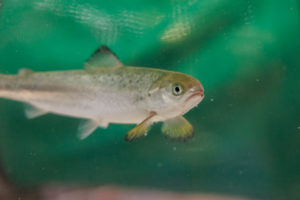
In order to have impact on the development of aquaculture, the applied knowledge we create need to have practical use. Here is a collection of 42 fact sheets from 8 years of research in CtrlAQUA. The main goal of CtrlAQUA (2015 to 2023) was to develop technological and biological innovations that will make closed systems…

CtrlAQUA SFI came to its end 31st March 2023, after eight yeaers with exiting and high-level industry relevant research, good discussions in the dedicated consortium, and having been a learning arena for more than 80 students and post-docs. In this final report we summarise activities in the centre during these years. Further information can be…

RAS has almost become an off-the-shelf product, while semi-closed facilities at sea still have a way to go. According to Chairperson Trond W. Rosten, this is the status after eight years of intense research conducted on fish in closed fish farms in CtrlAQUA. Written by Reidun Lilleholt Kraugerud for the CtrlAQUA Annual Report 2022. CtrlAQUA…

This annual report marks the end of eight years of research and innovation in CtrlAQUA SFI. “I believe that a lot of development has taken place during the eight years that the Centre has worked on the topic. The development of RAS and semi-closed systems have made significant improvements, both regarding technological development and how…

Salmon that have to adapt from a life in fresh water to a life in seawater need a robust immune system in order to make the transition. Nofima scientists have now developed a test that measures the immune status of salmon smolt. Written by: Reidun Lilleholt Kraugerud in Nofima The test can provide information that…

Hydrogen sulphide (H2S) poses an acute fatal risk to salmon that are farmed in facilities using recirculated seawater. Scientists have now found how sensitive the fish actually are to the gas. In land-based fish farms, salmon live in fresh water until they become smolt. Once smoltified, they are transferred to seawater. When this seawater is…

An important task for an SFI is to educate students. In 2021 the three PhD students John Davidson, Enrique Pino Martinez and Sharada Navada defended their degrees at the University of Bergen and NTNU. Three central pieces of the puzzle to make closed containment aquaculture off the shelf product, have been placed. Common for the…

Written by: Reidun Lilleholt Kraugerud for the CtrlAQUA Annual Report 2021 The fact that there are few salmon lice in semi-closed fish farms is the main argument for these farms having a future, says Are Nylund, a professor in fish health at the University of Bergen. Nylund has been researching pathogenic organisms in closed fish farms…

In the newly released annual report of CtrlAQUA for 2021, focus has been placed on to what extent CtrlAQUA results have made the closed-containment aquaculture systems more “off the shelf”. Besides containing a sum up of the year, scientific highlights and more, you can meet scientists and students in CtrlAQUA working on key questions: Do…

Raising large salmon smolt in Recirculating Aquaculture Systems (RAS) is pioneering work. Therefore, fish farmers have requested research on how different production strategies for large smolt in RAS affect growth, survival rates, welfare and sexual maturity during the sea phase. Scientists Trine Ytrestøyl from Nofima and Tom Ole Nilsen from the University of Bergen are…










